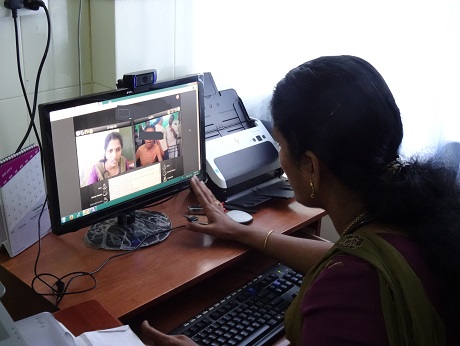
Kerala's enviable record in public health rests on a bedrock of remote service delivery
( This story has appeared in the April 2020 issue of Science Reporter)
April 5 2020: Kerala's response to Covid-19 has become a model for other states. It is a reputation built up over the years, handling the after effects of earlier epidemics as well as the widespread floods of 2018.
And at its centre is the consistent practice of remote service delivery, overcoming a shortage of specialist medical manpower, by harnessing Internet connectivity and video conferencing.
Dr M.S. Biji is head of the department of Cancer Palliative Medicine at the Malabar Cancer Centre,Thalassery, Kannur, Kerala. Together with the director Dr B. Satheesan, she has helped put in place the state's first e-Palliative care and support network, a variant of telemedicine that uses technology to provide real-time visual and audio patient assessment and online counseling to bedridden cancer patients , who are too sick to come to hospital. e-Pallative is grounded in reality: most patients don't have Internet connections or devices at home. So a nurse or medical worker travels to the patient's bedside with all the equipment to create a video link to MCC where on many days of the week Dr Biji is in attendance at a graphic workstation. The nurse on-site feeds the patient's vital readings and Dr Biji studies them in real time and counsels the cancer victim, bringing the warmth of a personal meeting . The initiative has become hugely popular and helps reach out to hundreds of cancer afflicted in Kerala, even while winning accolades at international forums for its cost-effective use of appropriate technology in oncology aftercare.
More recently, Dr Aneez Arakkal who runs a hospital in Kozhikode, Kerala, took on the challenge of reaching out to locked-down patients during the coronovirus crisis. He motivated a dozen other doctors to join him in forming a group through Facebook Messenger that could respond to queries from the sick who had no way to reach a hospital, rendering advice and helping to quell anxiety. When direct examination of patients is not possible, Dr Arakkal and his colleagues try to do the best they can, prescribing over-the-counter medicines.